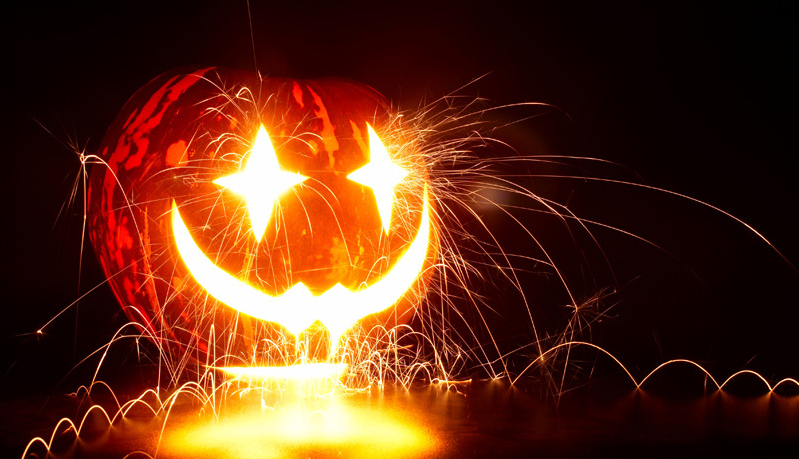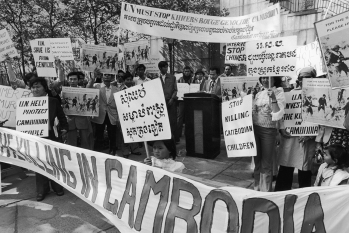
The spooky celebrations of Halloween last week and the fireworks focus of Guy Fawkes in England and parts of the Commonwealth this week serve as aspects of the making of England and Europe: cultures that have been shaped overwhelmingly by the story of the Christian Church. You probably never learnt at school that Halloween triggered the Reformation, for example.
A generation ago, Europeans did not generally celebrate Halloween. It was an American celebration. Globalization has changed that. Across Europe last week, businesses eagerly cashed in on the profit-making opportunities of ghosts, skeletons and death. Fun-lovers saw an occasion for crazy dressing-up, partying and the so-called harmless flirting with the spooky underworld.
On Halloween itself, the last day of October, Protestants commemorated Reformers Day, Martin Luther’s dramatic start to the Reformation. The next day, faithful Catholics observed All Saints Day lighting candles and praying for departed souls.
The name Hallowe’en comes from All Hallows’ Eve, on the traditional church calendar, the eve of All Saints’ Day—when all saints and martyrs are honored. It was a day for attending church and resting, a holy-day (from which we get ‘holiday’). Originally celebrated in May, this day was moved to November 1, possibly to absorb the pagan Celtic festival of Samhain (Gaelic for ‘November’ or ‘summer’s end’), as the ‘darker half’ of the year began. On the eve of Samhain, the boundary between this world and the Otherworld was thought to thin, inviting contact with the spirit world.
Then comes All Souls’ Day, November 2. That’s when prayers are offered for the recently departed still in purgatory, according to Catholic doctrine, where the dead atone for minor sins before reaching heaven.
The origins of Halloween traditions
Trick-or-treating may have come from the custom of children ‘"souling" on All Souls’ Day. Children would go door-to-door collecting "soul-cakes", small round spicy cakes marked with a cross to represent the dead for whom the children would promise to pray throughout November. These practices still survive in some parts of England and Portugal, for example.
Masks and costumes disguised oneself from dead souls looking for vengeance before moving on to the next world. Jack-o-lanterns, carved out pumpkins, with candles inside represented souls in purgatory. Children would sometimes light candles in human skulls in graveyards.
There was another way of shortening the agonies of the departed souls in purgatory: indulgences (a papal grant of remission of the temporal punishment in purgatory still due for sins after absolution). Which happened also to be a good way for the Pope to raise money to build St Peters in Rome.
The Reformation Day connection
After reading Paul’s letter to the Romans, Martin Luther became convinced that the buying and selling of indulgences was pure poppycock. So he drew up his list of theses, most of them reasons why indulgences were a sham. Thesis 27, for example, reads: "They preach only human doctrines who say that as soon as the money clinks into the money chest, the soul flies out of purgatory."
On Hallowe’en, when brisk business in indulgences was expected, Luther the stout monk nailed them to the town notice board, the Wittenberg Castle church door. At least, so the story goes and the Joseph Fiennes film on Luther portrays. Luther himself never wrote about that incident. But, shucks, it’s a graphic image. Historians can be nit-pickers. Anyway, we know he published his famous 95 Theses on Hallowe’en, now also known as Reformers’ Day.
That was the act which led to the split of Western Europe roughly into the Protestant north and the Catholic south. Protestants everywhere rejected the doctrine of purgatory as unbiblical, and with it all Halloween activities.
Caught red-handed
Thus after England became Protestant, Halloween was not celebrated there. But the English did find a cause to party with bonfires and fireworks. On November 5, in 1605, a Catholic plot to blow up Parliament, and with it royalty and nobility, was foiled. The unfortunate gunpowder expert, Guy Fawkes, was caught red-handed in the vault with 36 barrels of gunpowder. The conspirators were tortured and executed.
The Protestant parliament established November 5 as a day of public thanksgiving known as Guy Fawkes Day. Children would chant: “Remember, remember the 5th of November, gunpowder, treason and plot; for there is a reason why gunpowder and treason should ne’er be forgot.” Effigies of the poor Guy are traditionally burned on bonfires across the United Kingdom, Australia, New Zealand, Canada and South Africa on Guy Fawkes Day, accompanied by personal and public fireworks displays.
Dissatisfied Catholics in Scotland and Ireland later emigrated to America, taking with them their customs of Halloween where it would flourish in all states. Meanwhile the anti-hero Guy Fawkes has been resurrected as a populist icon through the "V for Vendetta" film and as the Occupy Movement hero fighting the unjust state.
All of which illustrates what we said above: English and European culture has been fundamentally shaped by Christianity. For better or for worse.
Originally published by Weekly Word. Republished with permission.
Jeff Fountain and his wife Romkje are the initiators of the Schuman Centre for European Studies. They moved to Amsterdam in December 2017 after living in the Dutch countryside for over 40 years engaged with the YWAM Heidebeek training centre. Romkje was founder of YWAM The Netherlands and chaired the national board until 2013. Jeff was YWAM Europe director for 20 years, until 2009. Jeff chaired the annual Hope for Europe Round Table until 2015, while Romkje chaired the Women in Leadership network until recently. Jeff is author of Living as People of Hope, Deeply Rooted and other titles, and also writes weekly word, a weekly column on issues relating to Europe.
Weekly Word is an initiative of The Schuman Centre for European Studies. Jeff Fountain is a New Zealander holding a Dutch passport, is currently the director of the Schuman Centre for European Studies (www.schumancentre.eu), and lives in Amsterdam, the Netherlands. Jeff graduated with a history degree from the University of Auckland (1972) and worked as a journalist on the New Zealand Herald (1972-3), and as travelling secretary for Tertiary Student Christian Fellowship (TSCF) (1973). He has lived in the Netherlands since 1975, and has travelled and spoken in almost every European country. For twenty years following the fall of communism, he was the European director for the international and interdenominational mission organisation, Youth With A Mission. He was chairman of the international, trans-denominational movement, Hope for Europe, for which he organised two pan-European congresses in Budapest in 2002 and 2011. In 2010, he established the Schuman Centre for European Studies (www.schumancentre.eu) to promote biblical perspectives on Europe’s past, present and future, to encourage effective engagement in issues facing Europe today.





